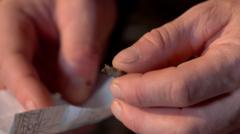In Ukraine's conflict zones, serviceman Serhiy Melnyk holds a small piece of rusty shrapnel, a grim reminder of a life-threatening injury he sustained during combat. The fragment became lodged in his heart and was responsible for severe internal damage – piercing his lung and kidney. “I didn't even realize what it was at first,” Serhiy shares, recalling the moment he was injured. Due to the prevalence of drone warfare, shrapnel wounds are becoming increasingly common, accounting for 80% of battlefield trauma, according to military medics. Left untreated, Serhiy's injury could have been fatal if not for a groundbreaking piece of medical technology: a magnetic extractor.
Cardiovascular surgeon Serhiy Maksymenko leads a team that has swiftly adapted to the changing needs of frontline medicine, using the magnetic extractor to retrieve shrapnel without the need for extensive surgery. The device allows for quick, minimally invasive procedures, significantly speeding up treatment and improving survival rates. In just one year, the team has performed over 70 successful operations, enabling them to save lives effectively.
The development of these extractors emerged from collaborative efforts between Oleh Bykov and frontline medics who identified the urgent need for advanced surgical tools. Inspired by historical uses of magnets in medicine during the Crimean War, the modernized version is capable of lifting heavy objects and performing delicate extractions with precision.
The magnetic devices are now being distributed widely across Ukraine, with around 3,000 units currently in use. Medical personnel like Andriy Alban depend on this tool while treating injured soldiers under difficult conditions, sometimes without local anesthesia due to the urgency of care required.
Despite not having official certification from the Ukrainian Health Ministry, the use of the extractors is permitted under circumstances of martial law, as they are deemed essential for military medical needs. This practicality takes precedence over red tape for many involved in the initiative, with Oleh asserting he is willing to bear the consequences for the vital technology's roll-out.
Veteran war surgeon David Nott emphasizes the potential of the magnetic extractor not only in Ukraine but in other conflict zones around the globe where similar savings of lives may be realized. As patients like Serhiy Melnyk benefit from these innovative developments, gratitude from their families echoes through the trauma of war, highlighting the importance of medical advancements in crisis situations.
Cardiovascular surgeon Serhiy Maksymenko leads a team that has swiftly adapted to the changing needs of frontline medicine, using the magnetic extractor to retrieve shrapnel without the need for extensive surgery. The device allows for quick, minimally invasive procedures, significantly speeding up treatment and improving survival rates. In just one year, the team has performed over 70 successful operations, enabling them to save lives effectively.
The development of these extractors emerged from collaborative efforts between Oleh Bykov and frontline medics who identified the urgent need for advanced surgical tools. Inspired by historical uses of magnets in medicine during the Crimean War, the modernized version is capable of lifting heavy objects and performing delicate extractions with precision.
The magnetic devices are now being distributed widely across Ukraine, with around 3,000 units currently in use. Medical personnel like Andriy Alban depend on this tool while treating injured soldiers under difficult conditions, sometimes without local anesthesia due to the urgency of care required.
Despite not having official certification from the Ukrainian Health Ministry, the use of the extractors is permitted under circumstances of martial law, as they are deemed essential for military medical needs. This practicality takes precedence over red tape for many involved in the initiative, with Oleh asserting he is willing to bear the consequences for the vital technology's roll-out.
Veteran war surgeon David Nott emphasizes the potential of the magnetic extractor not only in Ukraine but in other conflict zones around the globe where similar savings of lives may be realized. As patients like Serhiy Melnyk benefit from these innovative developments, gratitude from their families echoes through the trauma of war, highlighting the importance of medical advancements in crisis situations.
















